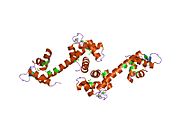Centrin 2
Appearance
Centrin-2 is a protein that in humans is encoded by the CETN2 gene.[5][6][7] It belongs to the centrin family of proteins.
Centrin-2 belongs to a family of calcium-binding proteins and is a structural component of the centrosome. The high level of conservation from algae to humans and its association with the centrosome suggested that centrin-2 plays a fundamental role in the structure and function of the microtubule-organizing center, possibly required for the proper duplication and segregation of the centrosome.[7]
Interactions
[edit]CETN2 has been shown to interact with XPC[8] and SFI1.[9]
References
[edit]- ^ a b c GRCh38: Ensembl release 89: ENSG00000147400 – Ensembl, May 2017
- ^ a b c GRCm38: Ensembl release 89: ENSMUSG00000031347 – Ensembl, May 2017
- ^ "Human PubMed Reference:". National Center for Biotechnology Information, U.S. National Library of Medicine.
- ^ "Mouse PubMed Reference:". National Center for Biotechnology Information, U.S. National Library of Medicine.
- ^ Tanaka T, Okui K, Nakamura Y (May 1995). "Assignment of the human caltractin gene (CALT) to Xq28 by fluorescence in situ hybridization". Genomics. 24 (3): 609–10. PMID 7713520.
- ^ Chatterjee A, Tanaka T, Parrish JE, Herman GE (Apr 1996). "Refined mapping of caltractin in human Xq28 and in the homologous region of the mouse X chromosome places the gene within the bare patches (Bpa) and striated (Str) critical regions". Mamm Genome. 6 (11): 802–4. doi:10.1007/BF00539008. PMID 8597638. S2CID 19420279.
- ^ a b "Entrez Gene: CETN2 centrin, EF-hand protein, 2".
- ^ Araki, M; Masutani C; Takemura M; Uchida A; Sugasawa K; Kondoh J; Ohkuma Y; Hanaoka F (Jun 2001). "Centrosome protein centrin 2/caltractin 1 is part of the xeroderma pigmentosum group C complex that initiates global genome nucleotide excision repair". J. Biol. Chem. 276 (22). United States: 18665–72. doi:10.1074/jbc.M100855200. ISSN 0021-9258. PMID 11279143.
- ^ Martinez-Sanz, J; Kateb, F; Assairi, L; Blouquit, Y; Bodenhausen, G; Abergel, D; Mouawad, L; Craescu, CT (Jan 8, 2010). "Structure, dynamics and thermodynamics of the human centrin 2/hSfi1 complex". Journal of Molecular Biology. 395 (1): 191–204. doi:10.1016/j.jmb.2009.10.041. PMID 19857500.
External links
[edit]- Human CETN2 genome location and CETN2 gene details page in the UCSC Genome Browser.
- Overview of all the structural information available in the PDB for UniProt: P41208 (Centrin-2) at the PDBe-KB.
Further reading
[edit]- Lee VD, Huang B (1994). "Molecular cloning and centrosomal localization of human caltractin". Proc. Natl. Acad. Sci. U.S.A. 90 (23): 11039–43. Bibcode:1993PNAS...9011039L. doi:10.1073/pnas.90.23.11039. PMC 47917. PMID 8248209.
- Wolfrum U, Salisbury JL (1998). "Expression of centrin isoforms in the mammalian retina". Exp. Cell Res. 242 (1): 10–7. doi:10.1006/excr.1998.4038. PMID 9665797. S2CID 8459226.
- Durussel I, Blouquit Y, Middendorp S, et al. (2000). "Cation- and peptide-binding properties of human centrin 2". FEBS Lett. 472 (2–3): 208–12. doi:10.1016/S0014-5793(00)01452-6. PMID 10788612.
- Mallon AM, Platzer M, Bate R, et al. (2000). "Comparative genome sequence analysis of the Bpa/Str region in mouse and Man". Genome Res. 10 (6): 758–75. doi:10.1101/gr.10.6.758. PMC 310879. PMID 10854409.
- Hartley JL, Temple GF, Brasch MA (2001). "DNA cloning using in vitro site-specific recombination". Genome Res. 10 (11): 1788–95. doi:10.1101/gr.143000. PMC 310948. PMID 11076863.
- Simpson JC, Wellenreuther R, Poustka A, et al. (2001). "Systematic subcellular localization of novel proteins identified by large-scale cDNA sequencing". EMBO Rep. 1 (3): 287–92. doi:10.1093/embo-reports/kvd058. PMC 1083732. PMID 11256614.
- Araki M, Masutani C, Takemura M, et al. (2001). "Centrosome protein centrin 2/caltractin 1 is part of the xeroderma pigmentosum group C complex that initiates global genome nucleotide excision repair". J. Biol. Chem. 276 (22): 18665–72. doi:10.1074/jbc.M100855200. PMID 11279143.
- Salisbury JL, Suino KM, Busby R, Springett M (2003). "Centrin-2 is required for centriole duplication in mammalian cells". Curr. Biol. 12 (15): 1287–92. doi:10.1016/S0960-9822(02)01019-9. PMID 12176356.
- Strausberg RL, Feingold EA, Grouse LH, et al. (2003). "Generation and initial analysis of more than 15,000 full-length human and mouse cDNA sequences". Proc. Natl. Acad. Sci. U.S.A. 99 (26): 16899–903. Bibcode:2002PNAS...9916899M. doi:10.1073/pnas.242603899. PMC 139241. PMID 12477932.
- Matei E, Miron S, Blouquit Y, et al. (2003). "C-terminal half of human centrin 2 behaves like a regulatory EF-hand domain". Biochemistry. 42 (6): 1439–50. doi:10.1021/bi0269714. PMID 12578356.
- Gavet O, Alvarez C, Gaspar P, Bornens M (2004). "Centrin4p, a novel mammalian centrin specifically expressed in ciliated cells". Mol. Biol. Cell. 14 (5): 1818–34. doi:10.1091/mbc.E02-11-0709. PMC 165080. PMID 12802058.
- Popescu A, Miron S, Blouquit Y, et al. (2003). "Xeroderma pigmentosum group C protein possesses a high affinity binding site to human centrin 2 and calmodulin". J. Biol. Chem. 278 (41): 40252–61. doi:10.1074/jbc.M302546200. PMID 12890685.
- Kilmartin JV (2003). "Sfi1p has conserved centrin-binding sites and an essential function in budding yeast spindle pole body duplication". J. Cell Biol. 162 (7): 1211–21. doi:10.1083/jcb.200307064. PMC 2173958. PMID 14504268.
- Chang F, Re F, Sebastian S, et al. (2004). "HIV-1 Vpr induces defects in mitosis, cytokinesis, nuclear structure, and centrosomes". Mol. Biol. Cell. 15 (4): 1793–801. doi:10.1091/mbc.E03-09-0691. PMC 379276. PMID 14767062.
- Tourbez M, Firanescu C, Yang A, et al. (2005). "Calcium-dependent self-assembly of human centrin 2". J. Biol. Chem. 279 (46): 47672–80. doi:10.1074/jbc.M404996200. PMID 15356003.
- Gerhard DS, Wagner L, Feingold EA, et al. (2004). "The status, quality, and expansion of the NIH full-length cDNA project: the Mammalian Gene Collection (MGC)". Genome Res. 14 (10B): 2121–7. doi:10.1101/gr.2596504. PMC 528928. PMID 15489334.
- Wiemann S, Arlt D, Huber W, et al. (2004). "From ORFeome to biology: a functional genomics pipeline". Genome Res. 14 (10B): 2136–44. doi:10.1101/gr.2576704. PMC 528930. PMID 15489336.
- Nishi R, Okuda Y, Watanabe E, et al. (2005). "Centrin 2 stimulates nucleotide excision repair by interacting with xeroderma pigmentosum group C protein". Mol. Cell. Biol. 25 (13): 5664–74. doi:10.1128/MCB.25.13.5664-5674.2005. PMC 1156980. PMID 15964821.










